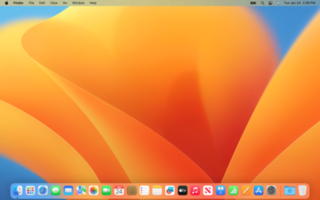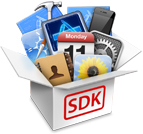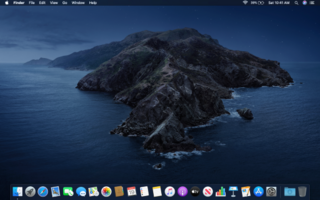
macOS is a Unix operating system developed and marketed by Apple Inc. since 2001. It is the primary operating system for Apple's Mac computers. Within the market of desktop and laptop computers it is the second most widely used desktop OS, after Microsoft Windows and ahead of ChromeOS.
Darwin is the core Unix operating system of macOS, iOS, watchOS, tvOS, iPadOS and bridgeOS. It previously existed as an independent open-source operating system, first released by Apple Inc. in 2000. It is composed of code derived from NeXTSTEP, BSD, Mach, and other free software projects' code, as well as code developed by Apple.
Carbon was one of two primary C-based application programming interfaces (APIs) developed by Apple for the macOS operating system. Carbon provided a good degree of backward compatibility for programs that ran on Mac OS 8 and 9. Developers could use the Carbon APIs to port (“carbonize”) their “classic” Mac applications and software to the Mac OS X platform with little effort, compared to porting the app to the entirely different Cocoa system, which originated in OPENSTEP. With the release of macOS 10.15 Catalina, the Carbon API was officially discontinued and removed, leaving Cocoa as the sole primary API for developing macOS applications.

XNU is the computer operating system (OS) kernel developed at Apple Inc. since December 1996 for use in the Mac OS X operating system and released as free and open-source software as part of the Darwin OS, which in addition to macOS is also the basis for the Apple TV Software, iOS, iPadOS, watchOS, and tvOS OSes. XNU is an abbreviation of X is Not Unix.
The Apple community is a group of people interested in Apple Inc. and its products, who report information in various media. Generally this has evolved into a proliferation of websites, but latterly has also expanded into podcasts, either speculating on rumors about future product releases, simply report Apple-related news stories, or have discussions about Apple's products and how to use them.

The Iconfactory is a software and graphic design company that designs commercial icons and user interfaces and publishes desktop applications and mobile apps for macOS and iOS.

Mac OS X Snow Leopard is the seventh major release of macOS, Apple's desktop and server operating system for Macintosh computers.

The iOS SDK, formerly the iPhone SDK, is a software development kit (SDK) developed by Apple Inc. The kit allows for the development of mobile apps on Apple's iOS and iPadOS operating systems.

OS X Mountain Lion is the ninth major release of macOS, Apple Inc.'s desktop and server operating system for Macintosh computers. OS X Mountain Lion was released on July 25, 2012, for purchase and download through Apple's Mac App Store, as part of a switch to releasing OS X versions online and every year, rather than every two years or so. Named to signify its status as a refinement of the previous OS X version, Lion, Apple's stated aims in developing Mountain Lion were to allow users to more easily manage and synchronise content between multiple Apple devices and to make the operating system more familiar.

Craig Federighi is an American engineer and business executive who is the senior vice president (SVP) of software engineering at Apple Inc. He oversees the development of iOS, iPadOS, macOS and Apple's common operating system engineering teams. His teams are responsible for delivering the software of Apple's products, including the user interface, applications and frameworks.

OS X Mavericks is the 10th major release of macOS, Apple Inc.'s desktop and server operating system for Macintosh computers. OS X Mavericks was announced on June 10, 2013, at WWDC 2013, and was released on October 22, 2013, worldwide.
Timer coalescing is a computer system energy-saving technique that reduces central processing unit (CPU) power consumption by reducing the precision of software timers to allow the synchronization of process wake-ups, minimizing the number of times the CPU is forced to perform the relatively power-costly operation of entering and exiting idle states.

OS X El Capitan is the twelfth major release of macOS, Apple Inc.'s desktop and server operating system for Macintosh. It focuses mainly on performance, stability, and security. Following the California location-based naming scheme introduced with OS X Mavericks, El Capitan was named after a rock formation in Yosemite National Park. El Capitan is the final version to be released under the name OS X. OS X El Capitan received far better reviews than did Yosemite.
TouchArcade is a mobile video game website that launched in 2008. Arnold Kim of MacRumors worked on the site and its editor-in-chief was Eli Hodapp from 2009 to 2019.

macOS Sierra is the thirteenth major release of macOS, Apple Inc.'s desktop and server operating system for Macintosh computers. The name "macOS" stems from the intention to uniform the operating system's name with that of iOS, watchOS and tvOS. Sierra is named after the Sierra Nevada mountain range in California and Nevada. Its major new features concern Continuity, iCloud, and windowing, as well as support for Apple Pay and Siri.
Apple File System (APFS) is a proprietary file system developed and deployed by Apple Inc. for macOS Sierra (10.12.4) and later, iOS 10.3 and later, tvOS 10.2 and later, watchOS 3.2 and later, and all versions of iPadOS. It aims to fix core problems of HFS+, APFS's predecessor on these operating systems. APFS is optimized for solid-state drive storage and supports encryption, snapshots, and increased data integrity, among other capabilities.
Acorn is a raster graphic editor for macOS developed by August Mueller of Flying Meat Inc, based out of Mukilteo, Washington, United States. Acorn was first released on September 10, 2007 and was built upon the framework of a previous image editing application of Flying Meat Inc., FlySketch.
Flutter is an open-source UI software development kit created by Google. It is used to develop cross-platform applications for Android, iOS, Linux, macOS, Windows, Google Fuchsia, and the web from a single codebase.

macOS Catalina is the sixteenth major release of macOS, Apple Inc.'s desktop operating system for Macintosh computers. It is the successor to macOS Mojave and was announced at WWDC 2019 on June 3, 2019 and released to the public on October 7, 2019. Catalina is the first version of macOS to support only 64-bit applications and the first to include Activation Lock. It is also the last version of macOS to have the major version number of 10; its successor, Big Sur, released on November 12, 2020, is version 11. In order to increase web compatibility, Safari, Chromium and Firefox have frozen the OS in the user agent running in subsequent releases of macOS at 10.15.7 Catalina.

Asahi Linux is a porting project, to develop support for Linux on Apple hardware, specifically Apple silicon-powered Macs, allowing them to run alternative operating systems in addition to macOS. The software design project was started and is led by Hector Martin. Work began in early 2021, a few months after Apple formally announced the transition to Apple silicon. An initial alpha release followed in 2022. The project has been made challenging by the lack of publicly available documentation of Apple's proprietary firmware.











